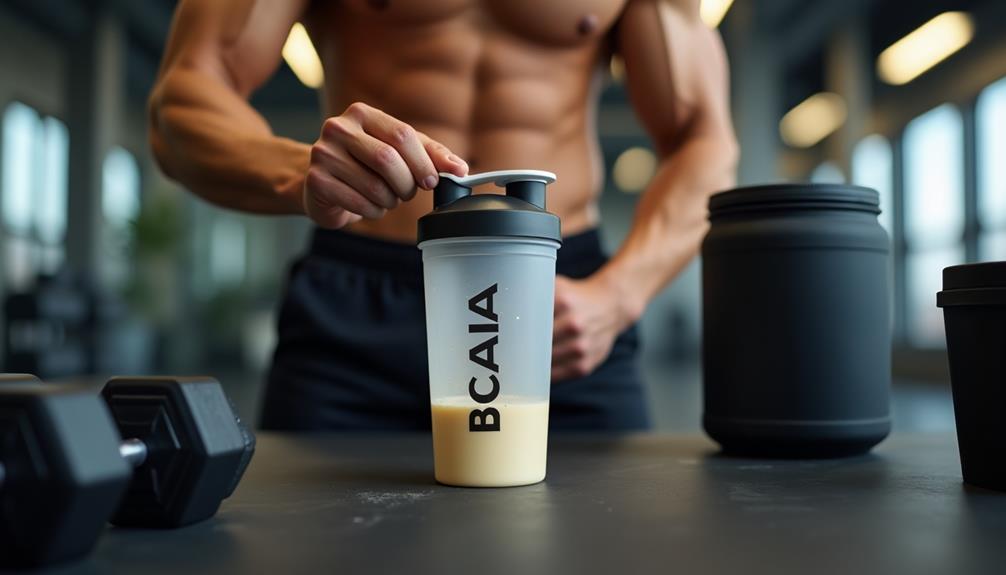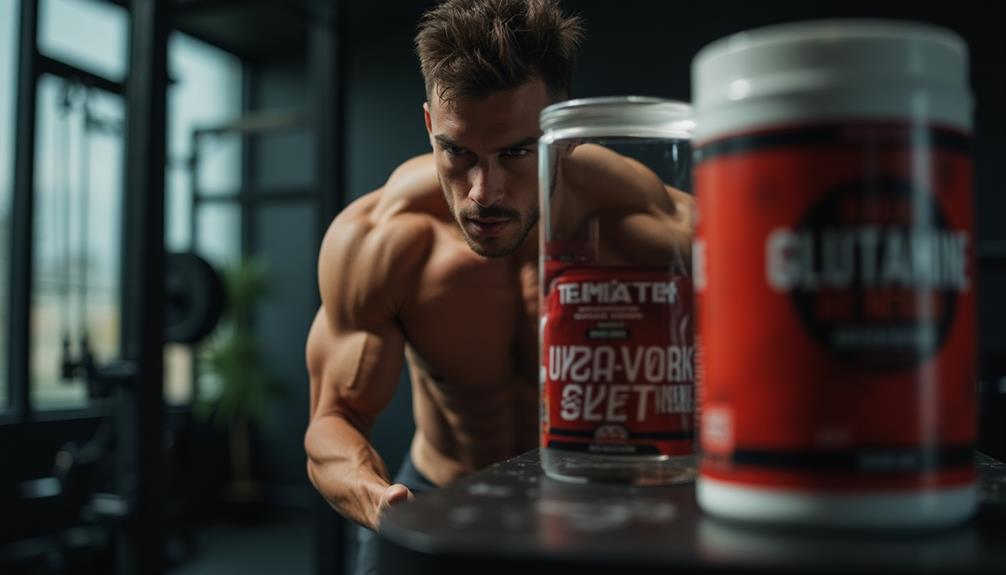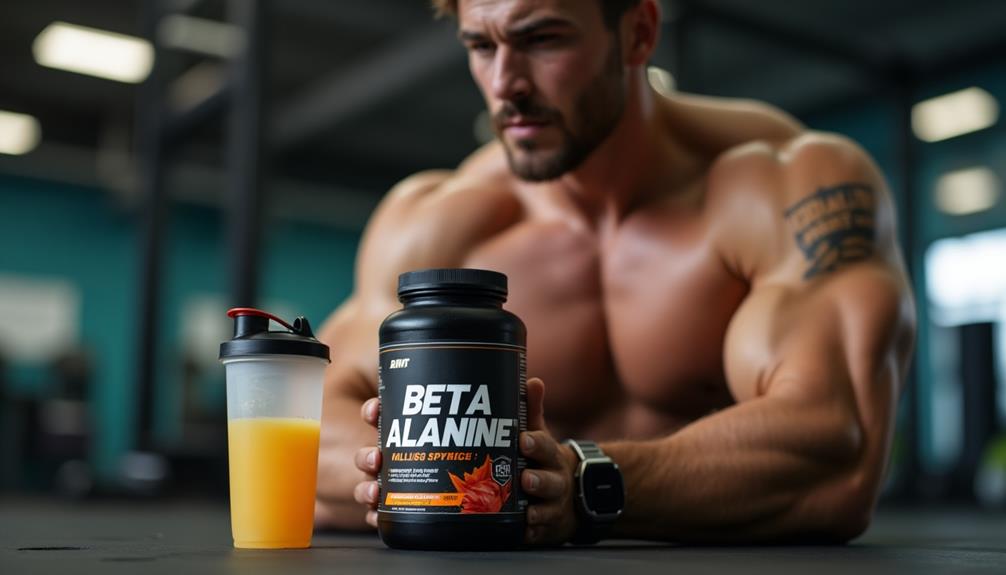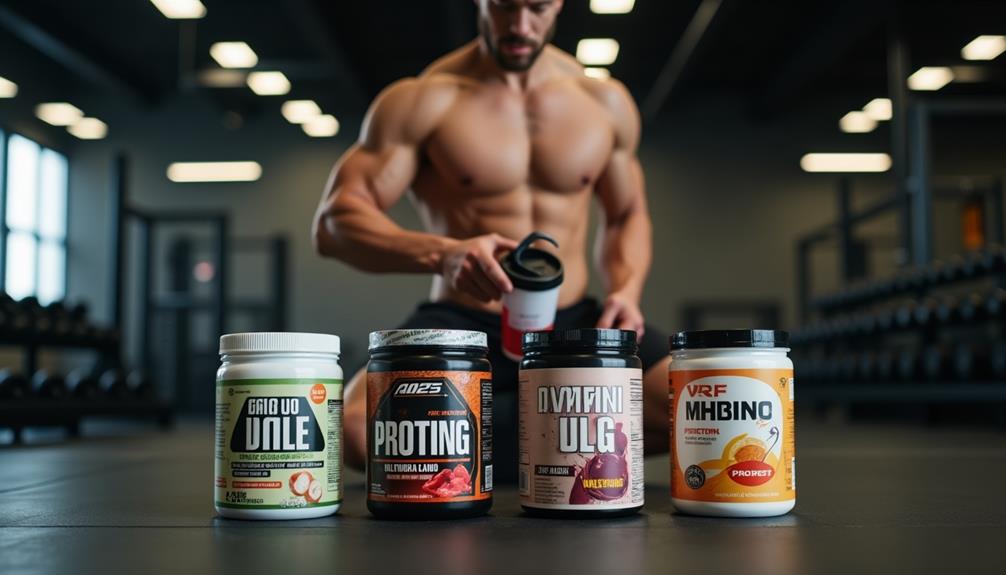For strength athletes, post-workout supplements are key to boosting recovery and muscle growth. Start with Whey Protein Isolate for rapid absorption and muscle repair. Next, consider Creatine Monohydrate to enhance strength and power. BCAAs are essential for reducing soreness and preventing muscle breakdown during intense training. Don't overlook Glutamine, which aids in recovery and glycogen replenishment. Beta-Alanine helps improve endurance by reducing fatigue. Incorporating these supplements into your routine can maximize your training results. Explore deeper insights and find tips for effective supplementation to support your strength goals.
Core Insights
- Whey Protein Isolate: Provides high-quality protein for muscle recovery and growth with minimal fat and carbohydrates.
- Creatine Monohydrate: Boosts strength, power, and muscle mass by increasing ATP availability during high-intensity activities.
- BCAAs: Essential for protein synthesis, they reduce muscle soreness and prevent breakdown during intense training sessions.
- Glutamine: Aids in muscle recovery and glycogen replenishment, supporting immune function post-workout.
- Beta-Alanine: Enhances endurance and performance by increasing carnosine levels in muscles, reducing fatigue during workouts.
Whey Protein Isolate

After an intense workout, replenishing your muscles is essential, and whey protein isolate can be your best ally. This supplement offers a high-quality protein source, promoting muscle recovery and growth. With minimal fat and carbohydrates, it delivers pure protein, making it ideal for strength athletes focused on lean muscle gains. Quality supplements have been a focus of OnWhey since its establishment in 2010, guaranteeing athletes receive top-tier products for their fitness journey.
Whey protein isolate is quickly absorbed, providing your body with amino acids shortly after your workout. This rapid absorption helps reduce muscle soreness and improves recovery time. Mixing it with water or milk can create a convenient post-workout shake, easily fitting into your routine.
Incorporating whey protein isolate into your diet can enhance your performance and support your fitness goals. It's a simple yet effective way to make sure your muscles get the nutrients they need.
Creatine Monohydrate

Creatine monohydrate is one of the most researched and effective supplements for strength athletes seeking to enhance their performance. It works by increasing the availability of adenosine triphosphate (ATP) in your muscles, which fuels short bursts of high-intensity activity. By supplementing with creatine, you can improve strength, power, and muscle mass. While creatine is excellent for bulking, it's important to pair it with high-protein ready meals to maximize its muscle-building potential. This combination can help you achieve your strength and size goals more efficiently.
You should aim for a daily dose of about 3 to 5 grams, and you might notice results within a few weeks. It's best taken post-workout, ideally mixed with a carbohydrate source to maximize absorption. Remember to stay hydrated, as creatine pulls water into your muscle cells. By incorporating creatine monohydrate into your routine, you're taking a solid step toward achieving your strength goals.
BCAAs

When it comes to enhancing recovery and muscle growth, BCAAs (branched-chain amino acids) play a significant role for strength athletes. These essential amino acids—leucine, isoleucine, and valine—are essential for protein synthesis. When you consume BCAAs post-workout, they can help reduce muscle soreness and accelerate recovery. While BCAAs are essential, it's important to remember that mobility tools can also play a vital role in an athlete's overall performance and recovery. Incorporating both BCAAs and proper mobility practices can lead to improved outcomes.
You'll find that BCAAs can also prevent muscle breakdown during intense training. Taking them before or after your workouts can supply your muscles with the nutrients they require to recover effectively.
Incorporating BCAAs into your routine is simple, whether through supplements or high-quality protein sources. Just remember to keep your overall diet balanced. With BCAAs in your corner, you'll support your strength goals while boosting your recovery process.
Glutamine

Taking glutamine as a post-workout supplement can help replenish these levels. It supports muscle recovery by reducing muscle soreness and promoting glycogen replenishment. Additionally, glutamine aids in immune function, which is essential when you're pushing your body to its limits.
Incorporating glutamine into your post-workout routine can be simple. You can mix it with your protein shake or take it as a standalone supplement. By doing this, you're ensuring your body has the support it needs to recover effectively.
Beta-Alanine

After addressing the importance of glutamine for recovery, it's time to contemplate another potent supplement: beta-alanine. This amino acid plays a vital role in enhancing your performance during high-intensity workouts. It helps increase carnosine levels in your muscles, which buffers acid buildup, reducing fatigue.
When you supplement with beta-alanine, you may experience improved endurance and strength during your training sessions. This means you can push harder for longer, ultimately leading to better gains.
For best results, consider taking 2 to 5 grams daily, ideally split into multiple doses. You might notice tingling sensations, known as paresthesia, which is completely normal. Incorporating beta-alanine into your routine could notably enhance your athletic performance and recovery.
Frequently Asked Questions
Can I Take Multiple Supplements Simultaneously Post-Workout?
Yes, you can take multiple supplements simultaneously post-workout. Just make sure they're compatible and won't interfere with each other's absorption. It's wise to consult a healthcare professional to optimize your recovery and performance.
Are There Any Side Effects of Long-Term Supplement Use?
Like a double-edged sword, long-term supplement use can bring benefits but may also lead to side effects. You might experience digestive issues, nutrient imbalances, or dependency. Always consult a healthcare professional for personalized advice.
How Do I Determine the Right Dosage for My Needs?
To determine the right dosage for your needs, begin by evaluating your body weight, activity level, and specific goals. Consult a healthcare professional or nutritionist to confirm you're meeting your individual requirements safely and effectively.
Is It Safe to Use Supplements During a Cutting Phase?
Yes, it's generally safe to use supplements during a cutting phase, but you should focus on quality ingredients. Always consult a healthcare professional to guarantee they align with your specific goals and nutritional needs.
Can I Replace Whole Foods With These Supplements Entirely?
You shouldn't rely solely on supplements; they can't fully replace whole foods. While they offer convenience, whole foods provide essential nutrients and benefits that supplements simply can't replicate, ensuring your body gets everything it needs to thrive.

